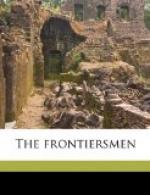Nothing less would content him. He hardened himself as flint against all suave beguilements tending to effect a diversion of interest. He would not see the horse-race. He would not “roll the bullet.” He would not witness the game of chungke, expressly played in honor of his visit. He even refused to join in the dance, although young and nimble. But it chanced that the three circles were awhirl on the sandy spaces contiguous to the “beloved square” when the first break in the cohesion of his pertinacity occurred. The red sunset was widely aflare; the dizzy rout of the shadows of the dancers, all gregarious and intricately involved in the three circles, kept the moving figures company. These successive circles, one within another, followed each a different direction in their revolutions to the music of the primitive flute, fashioned of the bone of a deer (the tibia), and the stertorous sonorities of the earthen drums; and as the fantastically attired figures whirled around and around, their dull gray shadows whisked to and fro on the golden brown sand, all in the red sunset glow.
Tscholens, quitting the council-house, glanced but indifferently at them and then away at the lengthening perspective of the azure mountains of the Great Smoky range. The harbingers of the twilight were advancing in a soft blue haze over the purple and garnet tinted slopes near at hand, their forests all leafless now, although the autumn had lingered long, and the burnished golden days of the Indian summer were loath to go. Lights were springing up here and there in the town as the glow of the hearths of the dwellings, where supper was cooking, flickered out to meet on the threshold the rays of the departing sun, which seemed to pause there for a farewell glance in at the open door. In the centre of the “beloved square” the fire which always burned here was slowly smouldering. It flung a red reflection on the front of the building devoted to the conferences of the aged councilors, painted a peaceful white and facing the setting sun. At this moment was emerging from it a figure which Tscholens had not before seen.




